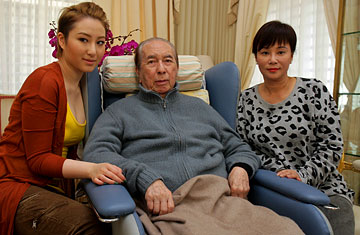
They call him the ‘King of Macau’ — and that’s no mere flourish. Stanley Ho, an enigmatic billionaire and one-time ballroom dancer, built a multi-billion dollar gambling empire that’s shaped almost every part of the former Portuguese colony on China’s southern coast. He’s weathered invasion by foreign competitors, forged alliances with the political elite, and fathered an impressive number of heirs — 17, by four women.
But Ho’s outsized reign may well be over. Now 89 and wheelchair-bound, he is caught in a most kingly conundrum: a battle over the fate of his estimated $3.1 billion fortune. Last week, it emerged that one faction of his family had wrested control of the bulk of his gambling holdings. They say they had permission — a claim he’s alternately confirmed and denied. The case has since seen more twists than a tawdry soap, each tracked with relish by the press in Hong Kong, where Ho lives. Photographers have decamped to the family’s estates and everybody, it seems, is speculating about their living arrangements. “Ho the daddy of them all when it comes to his hectic love life,” read one local newspaper headline. (Read about Macau’s casino boom.)
While the octogenarian’s sex life is a private matter, the family’s fractious squabbling is worthy of scrutiny. Ho is one of a handful of moguls that have dominated business and, arguably, politics, in Macau and Hong Kong for decades. Their families have enjoyed near monopolies in retail, property and, in Ho’s case, gambling. Now they’re growing old.
Like many of his peers, Ho built his kingdom during the colonial era. Born in British Hong Kong to a prominent, but ultimately penniless, Eurasian family, he fled to Macau during the Second World War, cut his teeth working for an import-export firm and married a legendary beauty with ties to the Portuguese colony’s ruling elite. In 1961, he won monopoly rights to all forms of gambling in the city. The next year, he took a second wife. (Polygamy was legal at the time.)
Both Ho’s holdings and his family have grown considerably since. Today Macau is the world’s biggest gambling market, generating some $23.5 billion last year — about four times more than Las Vegas. Ho and his clan saw the lion’s share of that money. Though American gaming giants entered the market after Ho lost his monopoly in 2001, the tycoon still controls the majority of the city’s casinos, as well as the airport, the ferries and the helicopter service that flies in the high rollers. Sometimes called Macau’s ‘underground governor,’ Ho once controlled more than half of its economy and the family business, STDM, is still the city’s biggest commercial employer. Two children from his second wife, Pansy and Lawrence, are also involved in gaming. Pansy owns a 50% stake in MGM Macau, and Lawrence runs Melco Crown Entertainment. (Watch a video about the popularity of poker in Macau.)
In neighboring Hong Kong, Ho also has deep ties to the territory’s unelected government and its high-flying tycoons. According to the South China Morning Post, an English-language daily, the billionaire is linked to eight major Hong Kong corporations, key government bodies and an array of public and philanthropic institutions. There are connections to mainland China too. Stanley Ho has been a member of an influential Communist Party committee since 1988. His third and fourth de-facto wives and two of his children are delegates to regional governing bodies.
The family’s importance to the region means officials may step in soon to protect investors. On Monday, Hong Kong lawmakers called for a probe into the scandal. “This is not just a family battle,” one politician, Chim Pui-chung told the South China Morning Post. Ho is free to divide his wealth, he said, but as chairman of two publicly listed companies, he also has a responsibility to shareholders. Shares in SJM, the Hong Kong listed firm linked to STDM, were down slightly Monday, but the company is holding strong. It appears that, at least in the short-run, it’s Ho’s reputation, not his business, that’s taking the hit.
So why would a savvy operator like Ho let this happen? That’s still a mystery. Ho may have been coerced, as he alleged (then denied), or he may simply be getting old, losing touch with the mechanics of empire. Joe Studwell, author of a book on tycoons, Asian Godfathers, says withholding assets is pretty typical of Hong Kong’s billionaire patriarchs. “Once they have the equity, his negotiating position within the family unit is based solely on filial piety, or what is normally called ‘love,’”he said via email. Ho’s situation, of course, is complicated further by the sheer number of family members involved.
And even that excess is relative. One of wealthiest man in 19th century Indonesia, sugar magnate Oei Tiong Ham, had 18 official concubines and 50 acknowledged children. That clan “ended up broke,” Studwell says. “But quite possibly happier.”